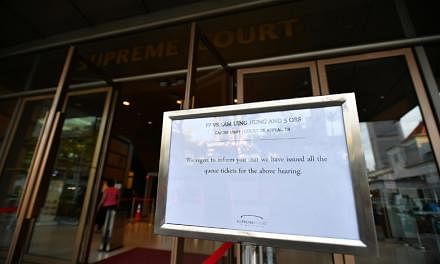SINGAPORE - The decision by the Court of Appeal is a long overdue clarification of the law on whether company directors should be regarded as agents in criminal breach of trust offences, say lawyers and legal academics, adding that it is now up to Parliament to plug the legal gap.
Similarly, the Court of Appeal said a review of Section 409 of the Penal Code - which was first enacted more than a century and a half ago and has remained largely unchanged - "was not only essential but also long overdue".
It is now up to Parliament to fix the "dated" piece of legislation that was used to charge City Harvest Church (CHC) founder Kong Hee and five former church leaders for misusing millions in church money, said the highest court in the land.
Section 409 states that a person who commits criminal breach of trust "in the way of his business as a banker, a merchant, a factor, a broker, an attorney or an agent" is subject to heavier punishment.
In Singapore, for the past 40 years, company directors who commit CBT have been charged under this section.
But on Thursday (Feb 1), the Court of Appeal affirmed a ruling last year that this was wrong in law as the term "agent" refers to professional agents, that is, people who make a living by offering services as agents.
As such, directors and key officers of charities, such as the six found guilty in the City Harvest Church case, cannot be convicted under Section 409. Their original convictions under this section was reduced to plain CBT under Section 406 by the High Court in April last year, which led to shorter jail terms.
The court acknowledged that there is a strong impulse to see crime punished in accordance with the perceived culpability of its perpetrators.
And in the modern context, where directors and officers of charities play key roles, there did not appear to be a good policy reason to ignore their heightened culpability and the enhanced potential for harm were they to commit CBT.
But the court said the task of law reform should be left to Parliament.
The court noted that in Malaysia, the legislature has reformed its equivalent of Section 409 by specifically enacting a broad provision, tailored for the modern commercial context, which targets, among others, trustees, directors and managers or other officers of any company, club, partnership or association.
"A sweeping reform that is carried out following a careful and comprehensive evaluation of the classes of persons who are deserving of enhanced criminal punishment is an outcome that a court simply cannot achieve through the exercise of statutory interpretation," said the court.
Lawyer Terence Seah, a partner at Virtus Law, said he welcomes this clarification because "for a long time it was always a little ambiguous or difficult to advise clients whether or not they will be covered as directors".
"Because in some sense, directors can be considered as agents, but it's not a strict legal classification," he added.
Explained Mr Shashi Nathan from Withers KhattarWong: "The court can't make law, the court can only state and interpret law. If there are changes to be made, it can only be made by legislation."
Lawyer Philip Fong from Eversheds Harry Elias noted that at the time when laws are enacted, lawmakers would not have envisaged what happens in future.
"There may be a need for laws to be updated to deal with existing social norms and structures."
Singapore Management University law don Eugene Tan noted that the Penal Code was first drafted in the Victorian England era.
"A Penal Code review is timely and urgent as well as a reminder not to accept conventional wisdom about what each provision means, and to ensure that the law remains relevant," he said.
Prof Tan added: "It may be hard for some to understand why for four decades the provision was accepted by prosecutors, lawyers and judges as applying to people in the same position of the City Harvest six.
"It took a case like this, with the legal firepower of several Senior Counsel, to expose the inadequacy of Section 409."







